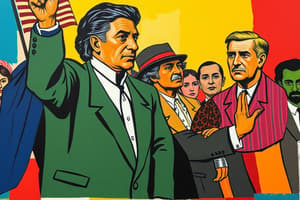Podcast
Questions and Answers
What doctrine did Thomas Paine promote?
What doctrine did Thomas Paine promote?
- Second Great Awakening
- Deism (correct)
- Unitarianism
- Public Education
What belief does Unitarianism promote?
What belief does Unitarianism promote?
God exists only in one person.
Women played a large part in the Second Great Awakening.
Women played a large part in the Second Great Awakening.
True (A)
Who formed the LDS Church in 1830?
Who formed the LDS Church in 1830?
Who led the Mormons to Utah after Joseph Smith's death?
Who led the Mormons to Utah after Joseph Smith's death?
What period did tax supported public education arise?
What period did tax supported public education arise?
Who campaigned for a better schooling system?
Who campaigned for a better schooling system?
What was the first state-supported university founded?
What was the first state-supported university founded?
Emma Willard established a women's school at the secondary level in the 1820s.
Emma Willard established a women's school at the secondary level in the 1820s.
What did the American Temperance Society aim for?
What did the American Temperance Society aim for?
Who is known as the 'Father of Prohibition'?
Who is known as the 'Father of Prohibition'?
What did the Maine Law of 1851 accomplish?
What did the Maine Law of 1851 accomplish?
The role of women in the early 1900s allowed them to vote.
The role of women in the early 1900s allowed them to vote.
Where did feminists meet in 1848 to address women's rights?
Where did feminists meet in 1848 to address women's rights?
What was emphasized due to the market economy in the 19th century?
What was emphasized due to the market economy in the 19th century?
What movement emerged from the liberalizing of Puritan theology?
What movement emerged from the liberalizing of Puritan theology?
Ralph Waldo Emerson urged American writers to follow European traditions.
Ralph Waldo Emerson urged American writers to follow European traditions.
Who wrote the novel 'Moby Dick'?
Who wrote the novel 'Moby Dick'?
Flashcards are hidden until you start studying
Study Notes
Religious Movements
- Deism: Promoted by Thomas Paine, emphasizing reliance on science over the Bible; rejected the divinity of Christ while believing in a supreme being who instills morality in humans.
- Unitarianism: Emerged from Deism; posits that God exists as a singular entity and appeals to intellectual communities.
- Second Great Awakening: Began in 1800, extensively involved women, highlighted class and regional divides, with limited impact on the wealthy.
Key Figures in Religion
- Joseph Smith: Founded the LDS Church in 1830 after interpreting golden plates from an angel; led Mormons to Illinois.
- Brigham Young: Succeeded Joseph Smith in 1844; guided Mormons to Utah.
Education and Reform
- Public Education: Evolved between 1825-1850; driven by the belief in educating children for the future, but faced financial constraints in establishing schools.
- Horace Mann: Central figure advocating for improved educational systems.
- Early Universities: The first state-supported universities appeared in the South starting in 1785.
Notable Educational Institutions
- University of Virginia: Established by Thomas Jefferson.
- Emma Willard: Pioneered secondary education for women beginning in the 1820s.
Legal and Penal Reform
- Debtors Prisons: Gradually eliminated due to public advocacy for reform.
- Criminal Codes: Many states began to soften penalties.
- Capital Offenses: Reduction in the number of crimes punishable by death.
- Prison Reform: Growing belief in rehabilitating prisoners.
Advocacy for the Mentally Ill
- Dorothy Dix: Advocated for better mental health care by documenting the conditions of asylums across the country; her efforts led to improved treatment for the mentally ill.
Temperance Movement
- American Peace Society: Founded in 1828, led by William Ladd, promoting peace initiatives.
- American Temperance Society: Established in 1826, it worked to persuade individuals to stop drinking, citing its destructive impact on family life.
- Neal S. Dow: Known as the "Father of Prohibition," he championed the idea of excluding alcohol from legislation and supported the Maine Law of 1851, which banned liquor sales.
The Role of Women
- Depicted as homemakers subservient to husbands; denied voting rights and property ownership after marriage.
- Seneca Falls: Site of the 1848 Women’s Rights Convention aiming to include women in the Declaration of Independence.
Utopian Movements
- Robert Owen: Founded a communal society in 1825 aimed at improving society; noted that all utopian experiments ultimately failed.
Technological and Medical Advances
- Practical Gadgets: Americans focused on practical inventions rather than pure scientific pursuits, leading to adaptations of European innovations.
- Medicine: Early 1840s medicine was primitive, though scientists began utilizing anesthetics like laughing gas and ether.
Cultural Developments
- Greek Revival: Architectural movement in America from 1820 to 1850 that borrowed heavily from European styles.
- Influence of Literature: Post-Revolutionary War, American literature surged through nationalism, though much was derived from European sources.
- Key Literary Figures:
- Washington Irving: The first American author to gain international acclaim.
- James Fenimore Cooper: Recognized as America's first novelist of global note.
Transcendentalism
- Transcendentalist Movement: Stemmed from a liberal interpretation of Puritan theology; focused on the belief that knowledge goes beyond sensory experience.
- Ralph Waldo Emerson: Poet and philosopher who encouraged American writers to express American ideals instead of European influences.
- Henry David Thoreau: Advocated for simplicity, aiming to allocate more time for truth-seeking through introspection.
Notable Poets
- Henry Wadsworth Longfellow: A prominent poet who appealed to both cultured and less cultured audiences.
- Edgar Allan Poe: Known for his pessimistic writing style, which contrasted with contemporary literature.
- Herman Melville: Author of "Moby Dick," reflecting complex themes and human struggles.
Studying That Suits You
Use AI to generate personalized quizzes and flashcards to suit your learning preferences.




